Table of Contents
- What are the Best Mushrooms for Menopause?
- Do Mushrooms Balance Hormones?
- Which mushroom is best for female hormones?
- What are The Best Medicinal Mushrooms for Menopause?
- Can Lion’s Mane help with menopause?
If you’re feeling overwhelmed by the physical and emotional changes of menopause, you’re not alone. Many women experience this challenging phase and search for effective, natural solutions to help ease the transition.
Let Me Share a Little About Myself
I’m 53 years old, and I’ve been fortunate to go through menopause without experiencing many of the common symptoms. However I have to admit, with my office job and getting less exercise lately, I have noticed a slight increase in belly fat. Thankfully, it’s nothing that can’t be reversed!
Is it possible to lose weight during perimenopause/menopause?
Intermittent fasting, Fasting, a mix of weight lifting, and some fun Zumba classes online have helped me stay active and keep those extra pounds in check.
As a nutritionist fascinated by the power of medicinal mushrooms and their impact on hormonal health, I’m here to guide you through some incredible options and how to manage menopause symptoms at home.
Are mushrooms good for hormones? Yes they are.
Best mushrooms for menopause are part of my morning routine, without any exceptions. I take powder mushrooms for menopause , general and mental health and wellbeing

Hormone balance is crucial for women’s health, especially during menopausal transitions.
Consuming mushrooms can be beneficial for women undergoing menopause, particularly those with hypercholesterolemia. Mushrooms are recommended to help manage body weight and increase the intake of vitamin E and dietary fiber, which can be particularly helpful during menopause due to their nutritional content and potential to aid in managing symptoms related to cardiovascular health
Certain mushrooms for menopause like Reishi, Lion’s Mane, Maitake, and Cordyceps have been explored for their potential benefits in supporting hormone balance. Reishi mushrooms are particularly noted for their ability to help manage perimenopausal symptoms and may regulate estrogen and testosterone levels.

Lion’s mane is another popular choice, often discussed in the context of menopause, as it may aid in managing symptoms without directly influencing estrogen levels. Turkey tail and Cordyceps mushrooms are also associated with supporting hormonal health during menopause, with cordyceps offering additional potential benefits for energy levels and vitality.
With various options available, the “Elixir of Life” is the best mushroom supplement for menopause UK.
It combines seven powerful mushrooms with a 30% beta-glucan content, making it a comprehensive choice for women seeking natural support during menopause.
Best Mushrooms for Menopause
- Reishi mushrooms can help manage perimenopausal symptoms.
- Lion’s mane could aid in managing menopause symptoms.
- The “Elixir of Life” supplement combines seven mushrooms for menopause support.
Understanding Menopause and Hormones
Menopause marks a significant phase in a woman’s life and is characterized by a reduction in ovarian follicle activity, estrogen production, various hormonal changes. This process can commence at various ages, potentially starting in a woman’s mid-30s or not occurring until her mid-50s.
Approximately 25% of individuals experiencing menopause will not encounter any symptoms. However, the remaining 75% may face a variety of effects, including insomnia, brain fog, increased body mass, sudden feelings of warmth, joint discomfort, and additional manifestations.
The menopausal transition can present significant difficulties, as its effects can impact various aspects of life, including family relationships, professional responsibilities, and domestic routines.
The Physiology of Menopause
Did you know this transition is divided into the early and late phases?
This decline reduces the production of key hormones like estrogen and progesterone. The hypothalamus and pituitary gland help regulate these hormones, managing various feedback loops within the body. Hormone levels fluctuate until they stabilize at lower levels, ending menstrual cycles.
During the early transition phase, many women still experience regular menstrual cycles but start noticing common menopausal symptoms like mild hot flashes, night sweats, or mood swings. The body tries to maintain balance by increasing certain hormones, like follicle-stimulating hormone (FSH), to support the diminishing number of ovarian follicles.
As women move into the late transition phase, the symptoms can become more pronounced due to a more significant decline in estrogen levels. This phase is often associated with more noticeable symptoms, such as intense hot flashes, sleep disturbances, and bone mineral loss.
Hot flashes usually last several minutes and start with a warm, flushing feeling that spreads across the upper body. These symptoms happen because the body temperature rises quickly and blood vessels widen. On average, hot flashes last for 4 to 5 years, but for about a quarter of women, they can continue for up to 10 years.
Did you know that women can be in the premenopause phase (also known as perimenopause) for several years, often lasting anywhere from 4 to 10 years before reaching full menopause? This time of gradual change can vary greatly from person to person.
An important point to consider during menopause is the reliability of thyroid blood tests. Hormonal fluctuations during this time can affect thyroid function readings, making these tests unreliable. This is why it’s crucial to look at the overall health picture rather than rely solely on blood tests.
Another important aspect to address is weight management during menopause. Many women find that traditional advice—like simply changing their diet or exercising more—doesn’t lead to the desired results.
This is because hormonal changes during menopause, including a drop in estrogen, can impact metabolism and fat storage. It’s not just about working hard; it’s about working smart by understanding how hormones affect your body and developing a tailored approach to weight management that takes these changes into account.
What Causes You to Go Through Menopause Early
Early menopause can be caused by various factors. Genetics plays a role, as does certain medical treatment like chemotherapy or radiation. Autoimmune disorders may also trigger early menopause. Other factors include smoking, severe infections, and surgical removal of the ovaries.
What are the 34 Symptoms of Perimenopause
Perimenopause can lead to a wide range of symptoms. These include irregular periods, hot flashes, night sweats, weight changes, and mood swings. Other symptoms are difficulty sleeping, vaginal dryness, thinning hair, and loss of libido. Perimenopause affects each woman differently, and the intensity of symptoms can vary.
By understanding how menopause affects the body, women can better manage their symptoms and maintain a higher quality of life during this transition.
Do Mushrooms Balance Hormones?
Mushrooms, particularly Reishi, Lion’s Mane, Turkey Tail, Cordyceps, Shiitake, Maitake, Tremella. and Chaga, are often discussed for their potential benefits in balancing female hormones. This section will explore how these mushrooms interact with estrogen, testosterone, and other hormones relevant to women’s health.
Effects on Estrogen and Testosterone
Some mushrooms, like Reishi and Chaga, are believed to influence estrogen and testosterone levels. Reishi exhibits estrogen-like activity, which can help alleviate symptoms related to hormonal imbalances. Research on Reishi shows that it may normalize estrogen and progesterone levels. Chaga, another medicinal mushroom, is sometimes mentioned in this context, but scientific evidence is limited.
Important Points:
- Reishi may increase estrogen levels.
- Limited evidence of Chaga’s effect on estrogen and testosterone.
Is reishi mushroom good for perimenopause? Reishi Menopause
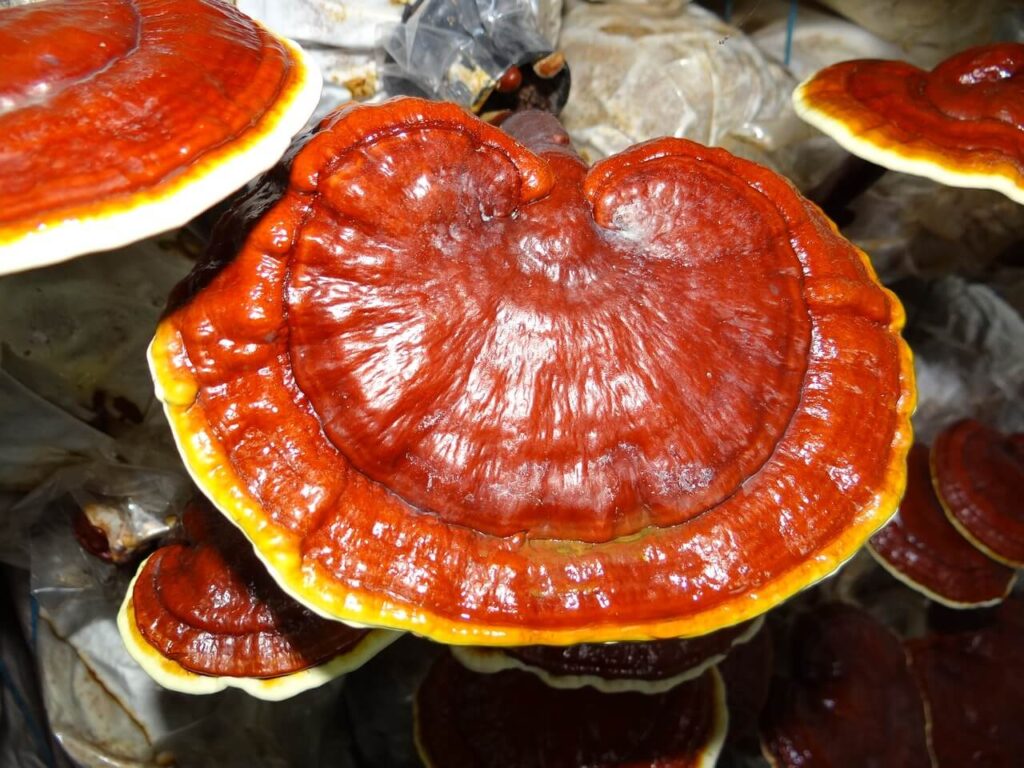
Reishi mushrooms (Ganoderma lucidum) have several potential health benefits that may be particularly relevant for women undergoing menopause. These mushrooms are known for their high antioxidant properties, which can help reduce oxidative stress—a common issue during menopause due to hormonal changes. A study demonstrated that reishi mushroom dry extract normalized antioxidant protection and reduced oxidative stress in a rat model of colon carcinogenesis, suggesting potential benefits in combating oxidative stress during menopause【I. Herasymets et al1.】
Additionally, reishi mushrooms have been shown to enhance the antioxidant, anti-inflammatory, and anticancer properties of food products when added as a supplement, such as in pasta. This suggests that incorporating reishi mushrooms into the diet could provide similar health benefits, including reducing inflammation and potentially lowering cancer risk, which could be advantageous during menopause【Magdalena Szydłowska-Tutaj et al. 2023】(link).
Key Points:
- Reishi supports adrenal functions.
- It may indirectly influence hormone balance.
Reishi mushrooms are considered adaptogens, meaning they help the body resist stressors. For those experiencing perimenopausal symptoms, reishi can provide relief from mood swings, irritability, and fatigue.
Overall, while direct studies on the benefits of reishi mushrooms specifically for menopause are limited, their antioxidant and anti-inflammatory properties make them a potentially valuable supplement for managing menopause symptoms and promoting overall health.
Is Lion Mane good for menopause?

Lion’s Mane (Hericium erinaceus) is recognized for promoting the growth of nerve cells. This can influence the hypothalamus, which plays a key role in hormone regulation.
Lion’s mane mushrooms have shown potential benefits for women going through menopause due to their unique bioactive compounds and antioxidant properties. One study highlights that lion’s mane mushrooms contain the highest concentrations of L-ergothioneine, an antioxidant that could be beneficial during menopause for combating oxidative stress【Cassi N. Uffelman et al. 2023】(link).
Additionally, lion’s mane mushroom powder added to foods, such as pasta, demonstrated increased antioxidant, potential anti-inflammatory, and antiproliferative properties. These benefits suggest that incorporating lion’s mane mushrooms into the diet could support overall health and manage symptoms associated with menopause, such as inflammation and oxidative stress【Magdalena Szydłowska-Tutaj et al. 2023】(link).
Moreover, tea preparations made from lion’s mane mushrooms, especially the infusion form, have shown high levels of bioactive mycochemicals like phenols, which possess significant free radical scavenging potential. This makes lion’s mane a potential natural antioxidant source, further supporting its use during menopause to alleviate oxidative stress【Sandipta Ghosh et al.】(link).
Lastly, another study suggests that lion’s mane mushrooms may have a positive impact on brain health, nerve recovery, mood stabilization, and menopausal symptoms, making them a promising dietary supplement for managing menopause symptoms【Gilbert David and Jessica Williams 2023】(link).
These findings suggest that lion’s mane mushrooms could be a valuable addition to the diet for women experiencing menopause, offering a range of health benefits that could help alleviate various symptoms.
Though not traditionally associated with menopause, its neuroprotective properties might help manage cognitive symptoms linked to hormonal changes.
Key Points:
- Supports nerve cell growth.
- May help manage cognitive symptoms during menopause.
Does Turkey Tail balance hormones?
Turkey Tail mushroom is often praised for its immune-boosting benefits, however what about turkey tail mushroom menopause?

Turkey Tail mushrooms (Trametes versicolor) offer several potential health benefits that may be particularly advantageous for women going through menopause. These mushrooms are rich in bioactive compounds such as β-glucans, triterpenes, and phenolic compounds, which are known for their antioxidant, anti-inflammatory, and immunomodulatory effects. These properties can help manage oxidative stress, boost immune function, and reduce inflammation—key concerns during menopause【O. O. Ajibola et al. 2024】(link).
Research on Turkey Tail mushrooms highlights their ability to mitigate oxidative stress, hyperglycemia, and hyperlipidemia, as observed in studies involving rats with type 2 diabetes mellitus. This suggests that the mushrooms could be beneficial for managing blood sugar levels and lipid profiles during menopause, a period when metabolic changes are common. Lo et al.】(link).
Additionally, the polysaccharides extracted from Turkey Tail mushrooms have demonstrated high recovery rates and significant bioactivity, making them a promising natural supplement for enhancing health during menopause. These polysaccharides contribute to the mushroom’s overall health-promoting properties, including antioxidant and anti-inflammatory effects【John F. Rakus et al.】(link).
In summary, incorporating Turkey Tail mushrooms into the diet may provide menopausal women with support in managing oxidative stress, improving immune function, and maintaining metabolic health, thanks to their rich array of bioactive compounds.
Key Points:
- Enhances immune function.
- It may indirectly support hormonal balance.
Cordyceps for menopause. Does cordyceps increase estrogen?

Cordyceps are another functional mushroom that can support hormonal balance.
Cordyceps mushrooms, particularly Cordyceps militaris, have shown various health benefits that could be advantageous for menopausal women. Cordyceps mushrooms are known for their anti-aging, anti-fatigue, and immune-stimulating properties, which could help manage several menopause-related symptoms
Cordyceps militaris has also been highlighted for its potential in regulating menopause-induced obesity through its anti-obesity effects and estrogenic agonistic activity. This was demonstrated in studies involving ovariectomized rats, suggesting that these mushrooms could play a role in managing weight and hormone balance during menopause【Dongyeop Jang et al. 2022】(link).
Furthermore, Cordyceps mushrooms are rich in various bioactive metabolites, such as cordycepin and carotenoids, which have potent antioxidant activities. These antioxidants can help mitigate oxidative stress, a common challenge during menopause【Ying Yang et al.】(link). Additionally, Cordyceps mushrooms have demonstrated potential anticancer effects on breast cancer cells, which could be relevant for postmenopausal women at increased risk of such conditions【M. Gariboldi et al. 2023】(link).
They are particularly effective in boosting energy levels and reducing fatigue2. cordyceps one of the best mushrooms for hot flashes and night sweats. These mushrooms support healthy estrogen and testosterone levels by inhibiting the enzyme 5-alpha reductase.
There is some evidence that cordyceps may assist in increasing estrogen levels, though more research is needed. They also have antioxidant properties, which can improve overall health and vitality during menopause. Cordyceps can thus offer a natural alternative to hormone replacement therapy.
In summary, Cordyceps mushrooms offer a variety of benefits, including antioxidant, anti-inflammatory, and hormone-regulating properties, making them a promising supplement for women undergoing menopause to help manage symptoms and maintain overall health.
Shiitake Mushroom Testosterone

Shiitake mushrooms (Lentinula edodes) have several properties that could potentially benefit women during menopause due to their antioxidant content. Research has shown that shiitake mushrooms, along with other varieties like lion’s mane and oyster mushrooms, contain high concentrations of L-ergothioneine, a potent antioxidant that may help reduce oxidative stress, a common issue during menopause【Cassi N. Uffelman et al. 2023】(link).
While another study primarily focused on the effects of far-infrared drying on the physical properties and volatile odor characteristics of shiitake mushrooms, it suggested that the processed mushrooms might have enhanced nutritional qualities that could indirectly benefit menopausal health by improving overall well-being【Long Xie et al. 2023】(link).
Additionally, polysaccharides from shiitake mushrooms have been noted to reduce browning, maintain antioxidant activity, and inhibit enzymes related to browning and softening. These properties might enhance the nutritional value and shelf-life of shiitake mushrooms, making them a practical dietary inclusion for their potential antioxidant benefits【Yuxi Guo et al. 2022】(link).
Shiitake mushrooms contain compounds that support cardiovascular health and are also a good source of vitamin D. This can be particularly helpful during menopause when bone density becomes a concern.
While direct studies on the benefits of shiitake mushrooms specifically for testosterone are limited, their antioxidant properties and potential to maintain overall health make them a beneficial addition to the diet during this life stage.
Maitake mushroom testosterone
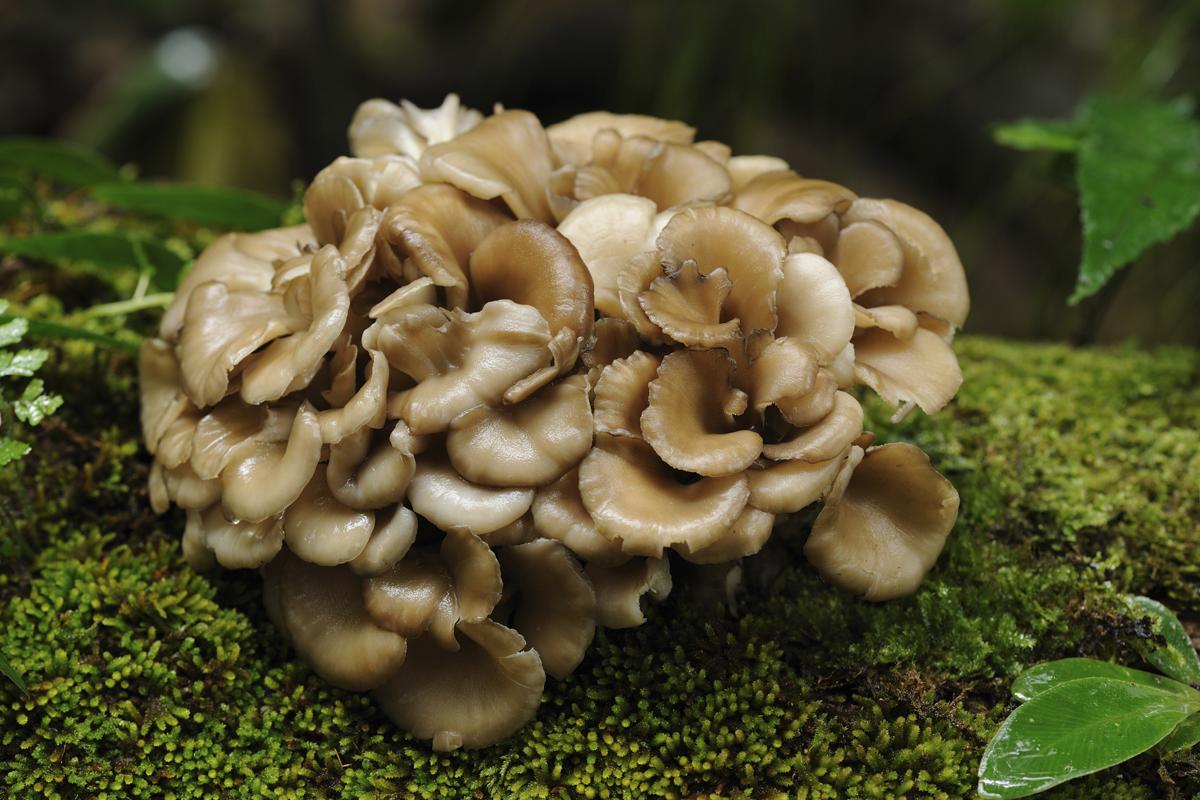
Maitake mushrooms (Grifola frondosa) have been identified as potentially beneficial for women undergoing menopause due to their rich antioxidant content and various medicinal properties. These mushrooms are noted for their high concentration of L-ergothioneine, a potent antioxidant that can help mitigate oxidative stress, a common issue during menopause. This was demonstrated in a metabolomics analysis comparing different mushroom varieties, including maitake mushrooms【Cassi N. Uffelman et al. 2023】(link).
Furthermore, maitake mushrooms have been explored for their broader medicinal potential, including possible benefits during menopause. They possess properties that enhance antibody production in response to influenza vaccination and alleviate common cold symptoms, suggesting they could support immune function during menopause【J. Nishihira et al. 2017】(link).
Maitake mushrooms also demonstrate neuroprotective effects through their antioxidative, anti-inflammatory, and anti-beta-amyloid activities. These properties may be particularly beneficial during menopause for protecting against cognitive decline and maintaining overall brain health【Adrina Mohamad Naguib et al.】(link).
Additionally, the extract of white maitake mushrooms has shown strong antioxidant abilities, attributed to compounds like tannic and gallic acids, which could further support the management of oxidative stress and promote overall health during menopause【Hsiao-ling Chen et al. 2017】(link).
Maitake mushrooms are known for their immune-boosting properties. They have been studied for their potential to regulate blood sugar levels and may help balance estrogen.
Does Maitake Mushroom Increase Estrogen
Maitake mushrooms have shown promise in supporting hormonal balance. Some studies suggest they may help increase estrogen levels, which can be useful during menopause. These mushrooms contain compounds that mimic estrogen and can help alleviate menopausal symptoms.
Maitake mushrooms are rich in beta-glucans, which are crucial for immune function. The estrogen-mimicking properties of maitake can be particularly beneficial for those experiencing hormonal imbalances. The inclusion of maitake mushrooms in one’s diet offers both immune support and potential hormone regulation.
Overall, incorporating maitake mushrooms into the diet may provide multiple health benefits for menopausal women, including enhancing immune response, offering neuroprotective effects, and providing robust antioxidant support.
Tremella Mushroom Benefits

Tremella mushrooms (Tremella fuciformis), also known as white jelly mushrooms, have several properties that could be beneficial for women experiencing menopause. These mushrooms are rich in bioactive compounds, such as lanosterol and lupeol, which have traditional uses for treating skin and eye conditions, suggesting potential applications for managing menopause-related symptoms like skin aging and dryness【R. Ohiri 2017】(link).
Tremella mushrooms are also known for their immune-boosting and hepatoprotective effects. These properties could help mitigate the increased susceptibility to infections and liver health issues that can sometimes accompany menopause【W. Elkhateeb 2021】(link). Additionally, Tremella mushrooms are abundant in soluble polysaccharides, which may contribute to improved gut health and potentially reduce menopause-related digestive issues【Shuai Zhou et al.】(link).
Research has also shown that incorporating Tremella mushrooms into food products, like sorghum biscuits, can reduce the glycemic response and increase the content of beneficial proteins and phenolics. This could help manage blood sugar levels and improve overall nutritional intake, which is crucial during menopause【J. Tu et al. 2021】(link).
Tremella mushrooms are highly regarded for their hydrating properties. They are often used in beauty products to improve skin health. For menopausal women, the hydration provided by tremella mushrooms can help alleviate the dryness commonly experienced during this phase.
Tremella mushrooms are also rich in antioxidants, which can fight oxidative stress. This makes them useful for maintaining youthful skin and overall vitality. Their unique ability to retain moisture can provide specific benefits for menopausal women.
Choosing the best menopause mushroom blend
Selecting the best mushroom supplements for menopause is crucial for managing symptoms effectively.
Key considerations include specific blends like the Elixir of Life and the beta-glucan content in powder supplements.
Elixir of Life Best Mushroom Supplement for Menopause
The Elixir of Life supplement is well-regarded for menopause, containing seven powerful mushrooms. This blend includes Reishi, Lion’s Mane, Cordyceps, Maitake, Tremella, Shiitake, and Turkey Tail. Each mushroom offers unique benefits that help manage menopause symptoms.
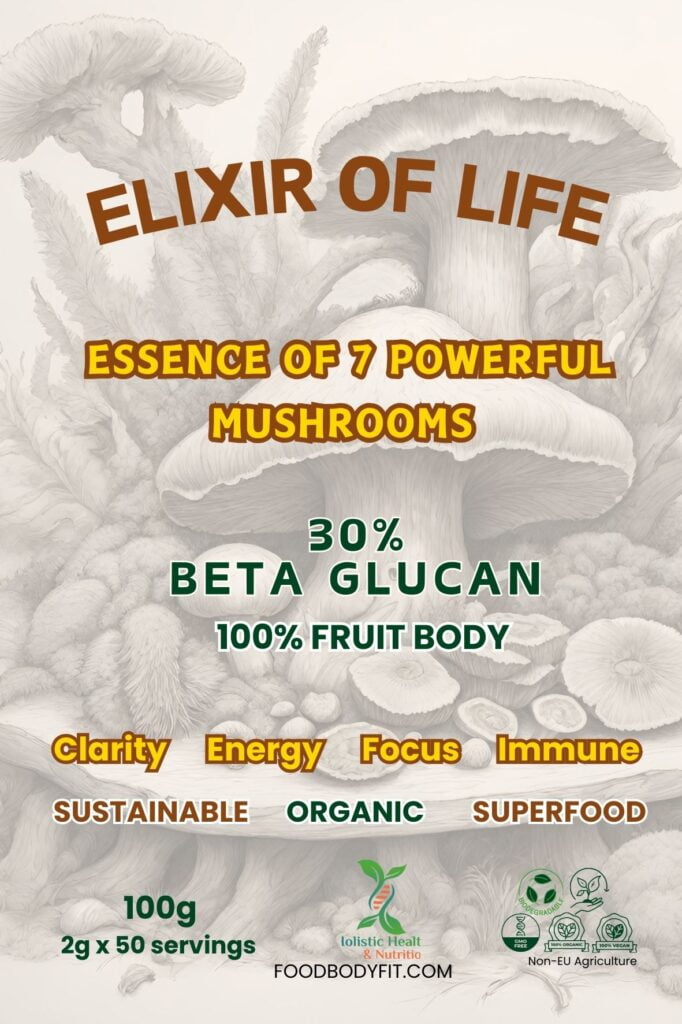
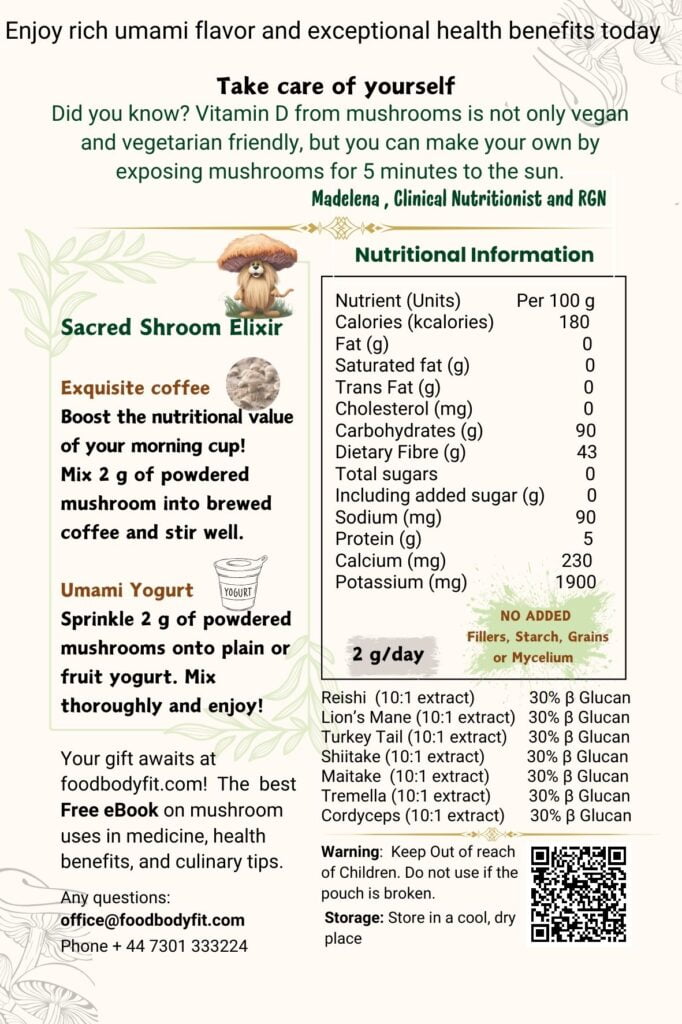
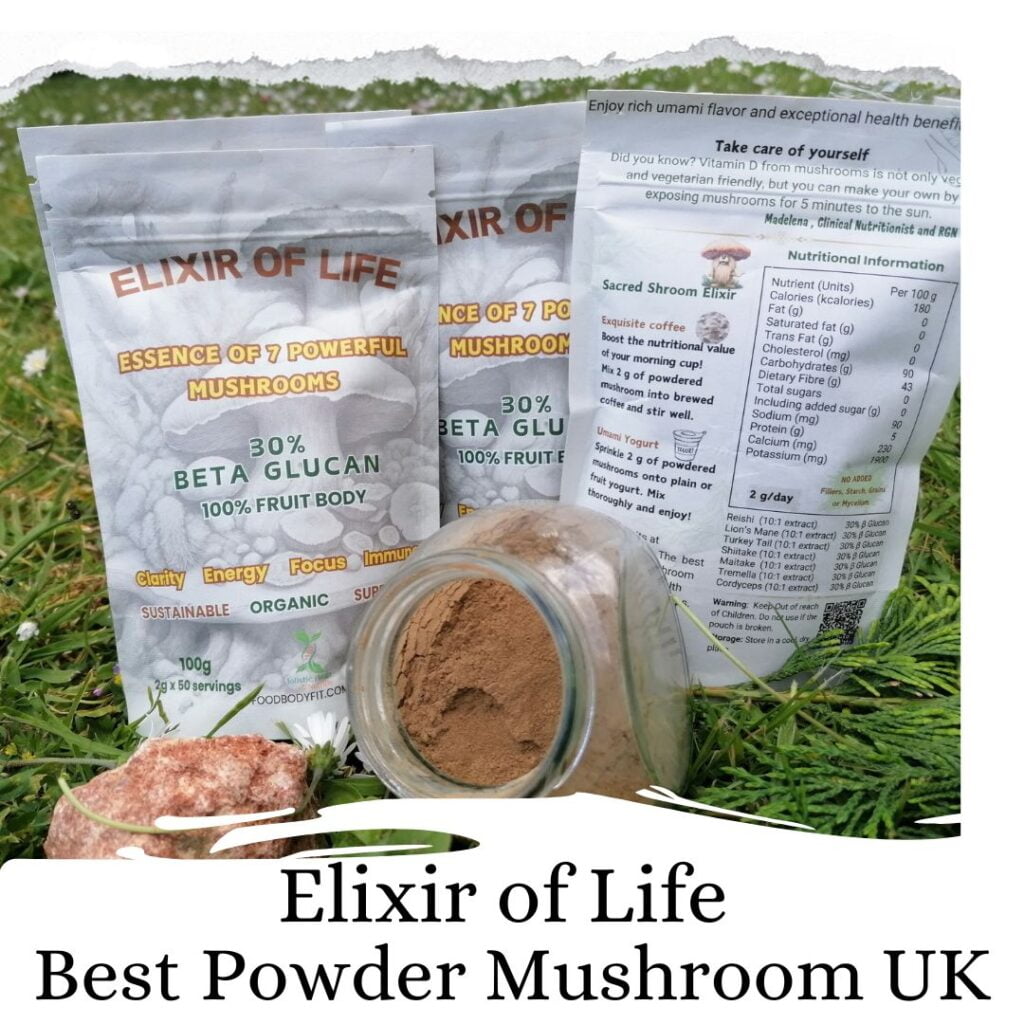
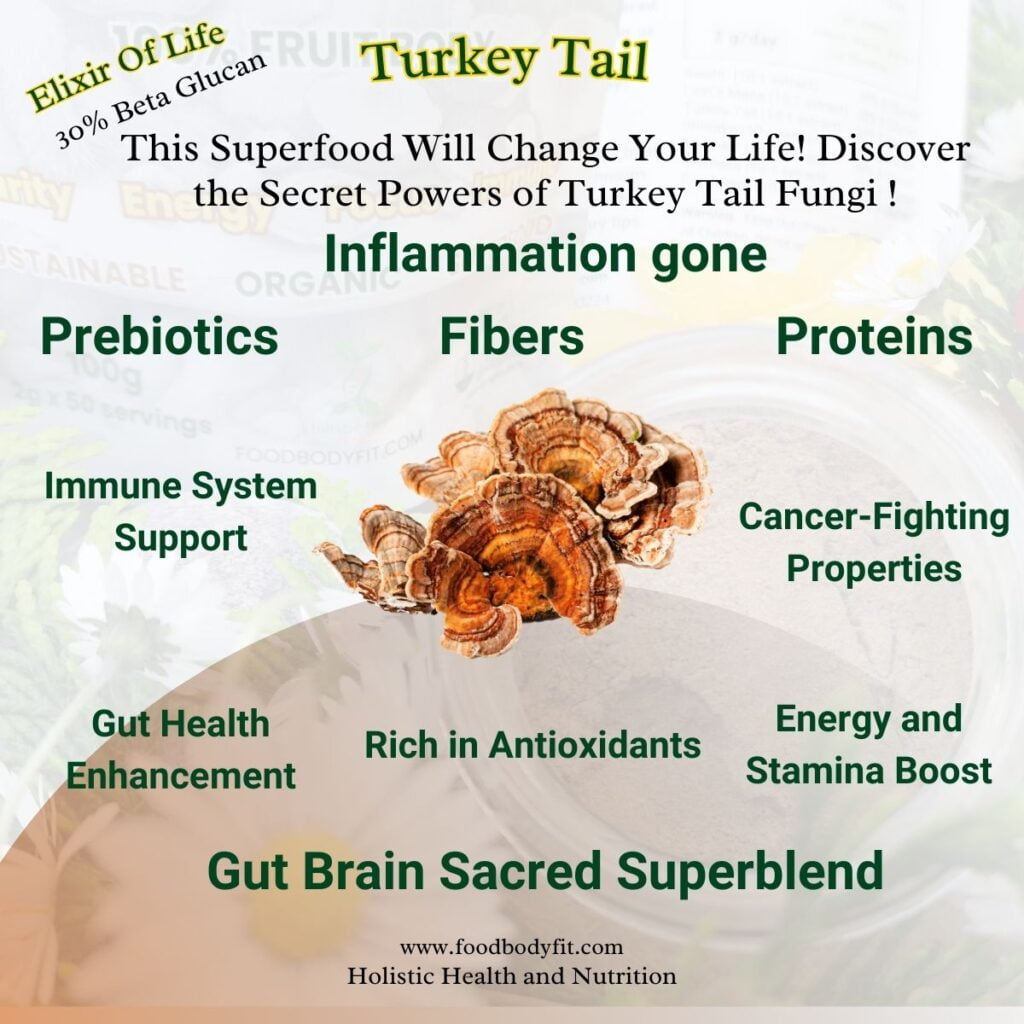
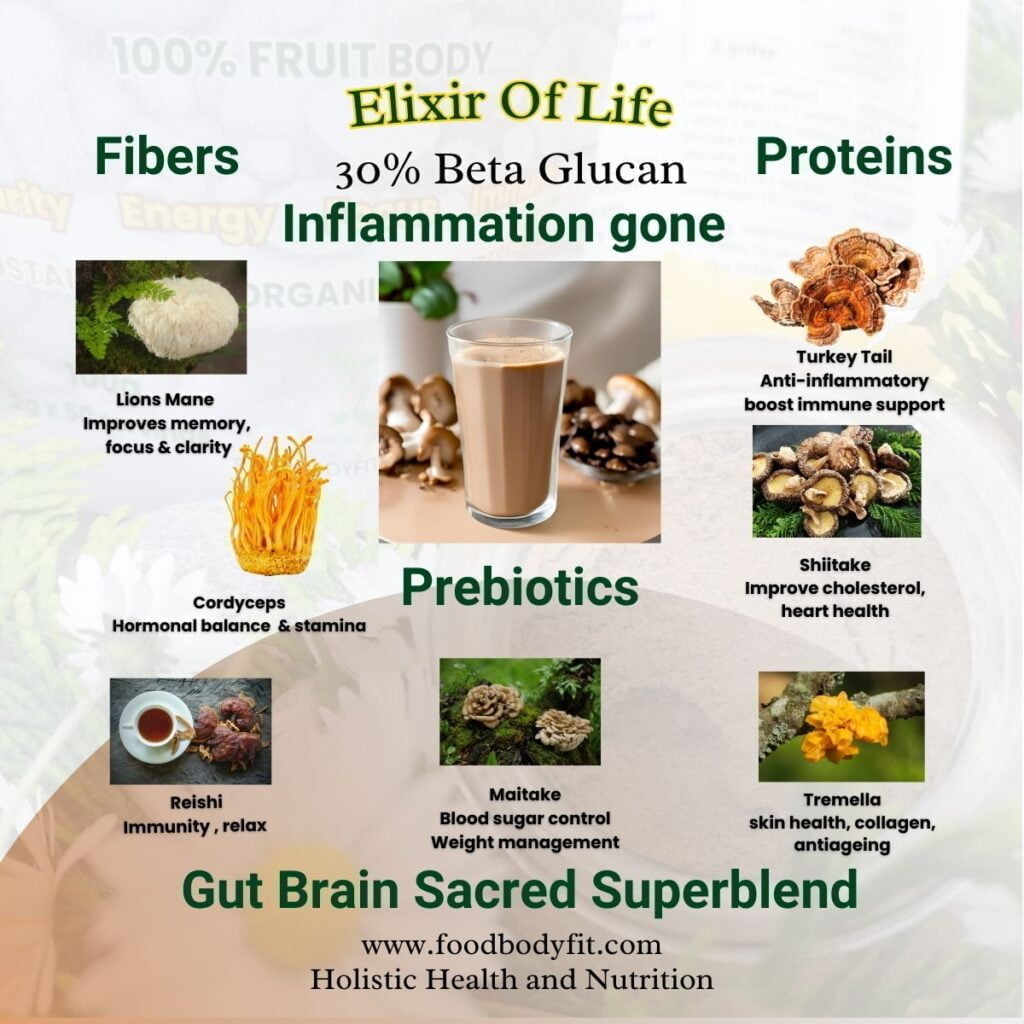

Reishi and Cordyceps support hormonal balance by reducing stress and improving sleep. Lion’s Mane can enhance mental clarity. Maitake and Shiitake may aid in regulating estrogen levels. Tremella and Turkey Tail offer immune support, which is vital during hormonal changes.
Powder Supplements and Beta Glucan Content
Powder supplements for menopause should have a high beta glucan content, ideally around 30%. Beta-glucans are polysaccharides that boost immune system health and can help alleviate menopause symptoms.
These powders are easy to incorporate into daily routines, either in drinks or food.
Selecting these mushrooms and ensuring high beta-glucan levels can provide a balanced, holistic approach to managing menopause symptoms.
Frequently Asked Questions
Mushrooms can play a role in supporting hormonal balance, particularly during menopause and perimenopause.
How Can I Reverse My Perimenopause Weight Gain?
Reversing perimenopause weight gain can be challenging due to hormonal changes, slowed metabolism, and increased stress levels. However, it is possible to achieve effective weight loss with the right approach! Here are some steps you can take to start reversing your weight gain:
Prioritize Balanced Nutrition: Focus on a diet rich in whole foods, lean proteins, healthy fats, and fiber. Reducing refined carbohydrates and sugars can help stabilize blood sugar levels and reduce cravings.
Incorporate Strength Training: Building muscle through resistance exercises can boost your metabolism and help counteract the natural muscle loss that occurs with age.
Manage Stress Effectively: Elevated stress levels can lead to higher cortisol levels, which may cause weight gain around the abdomen. Incorporating mindfulness techniques, yoga, and meditation can help reduce stress and support weight loss.
Stay Hydrated and Get Adequate Sleep: Hydration supports metabolism and overall health, while proper sleep helps regulate hunger hormones, reducing the likelihood of overeating.
Stay Consistent with Physical Activity: Regular exercise, combining both cardiovascular activities and strength training, is essential for maintaining a healthy weight during perimenopause.
Exciting News!
In just three months, we will be launching a brand-new program specifically designed for pre-menopausal women like you! This program will address the unique challenges of weight loss during perimenopause, with tailored strategies for balancing hormones, boosting metabolism, and achieving sustainable weight loss. Stay tuned for more details and get ready to start your journey toward a healthier, happier you!
Does lion mane increase estrogen?
Lion’s mane is primarily known for its benefits on cognitive health, but it might also positively influence hormonal balance. It supports the growth of nerve cells, which can help with hormone regulation. Currently, there is no strong evidence that Lion’s Mane directly impacts estrogen levels.
Chaga mushroom menopause
Chaga mushroom is reputed for its antioxidative properties. While it isn’t directly linked to hormone balance, its role in reducing oxidative stress could help ease menopause symptoms. However, robust scientific backing for these claims is limited.
Key Points:
Antioxidative properties.
Potential to ease menopause symptoms.
Chaga mushroom estrogen
Chaga’s impact on estrogen is not well-documented. While some anecdotal evidence suggests it might influence estrogen levels, more research is needed. It is mainly known for its general health benefits rather than specific hormone-related effects.
Key Points:
Lack of substantial evidence on estrogen effects.
Known for overall health benefits.
Does Chaga Affect Testosterone?
Chaga’s influence on testosterone levels remains unclear. There are limited studies or clinical trials to confirm any significant effects. Most claims are based on traditional uses and anecdotal reports rather than scientific data.
Key Points:
Limited evidence on testosterone impact.
Mostly traditional and anecdotal claims.
Does Reishi Mushroom increase Estrogen?
Reishi mushrooms may help balance hormones during perimenopause by supporting adrenal glands and reducing stress. This can help mitigate common symptoms like hot flashes and mood swings. Additionally, Reishi is said to help with overall hormonal health, though direct evidence is still limited.
Mushrooms for hot flashes. Does Reishi mushroom help with hot flashes
Reishi and Cordyceps are particularly noted for their benefits in balancing hormones and managing hot flashes. Reishi supports adrenal function, which can help reduce stress and associated symptoms. Cordyceps promotes vitality, which can help manage energy levels during menopause and reduce hot flashes.
Does Intake of Shiitake Mushrooms Affect Estrogen Levels In Women?
Shiitake mushrooms are rich in nutrients and have various health benefits, but there is limited information on their direct effect on estrogen levels. They can support overall health, which might indirectly help balance hormones but specific impacts on estrogen are not well-documented.
Do you wonder what is the best mushroom coffee for menopause?
Coffee mushrooms, a blend of coffee with medicinal mushrooms like reishi or lion’s mane, may not be advisable for menopausal women for several reasons. First, the caffeine in coffee can exacerbate menopause symptoms like hot flashes and night sweats by increasing body temperature and causing hormonal fluctuations. Second, caffeine can interfere with sleep quality, which is often already disrupted during menopause due to hormonal changes. Third, coffee is a diuretic and can lead to increased urination, potentially exacerbating bladder control issues common in menopause. Fourth, caffeine can increase anxiety and heart palpitations, which some menopausal women are already more prone to experience. Fifth, the combination of caffeine with mushrooms that have immune-modulating effects could potentially lead to unpredictable interactions or side effects in the sensitive hormonal balance during menopause.
Conclusion
Medicinal mushrooms can play a role in balancing female hormones. Reishi and Lion’s Mane are beneficial for perimenopause, while Cordyceps, Turkey Tail, Shiitake, and Maitake have other unique properties that support hormone health for women.
Studies suggest that Reishi can help mitigate menopausal symptoms like hot flashes and may have a balancing effect on estrogen and testosterone levels. Evidence indicates Cordyceps can also aid in hormone regulation, though more research is needed to confirm its effects on estrogen and testosterone.
Lion’s Mane is known for its cognitive benefits, but it can also support women during menopause. Turkey Tail contains bioactive compounds that can contribute to hormone balance and immune support.
For those looking for the best mushroom supplements for menopause, supplements like Elixir of Life, which combines seven powerful mushrooms, can be effective. Elixir of Life is the best functional mushroom supplements UK. These superfood feature a 30% beta-glucan content, which is important for overall health.
In summary, incorporating these medicinal mushrooms into daily routines may assist in managing menopause symptoms and balancing hormones. Always consult with a healthcare professional before starting any new supplement.
- Herasymets et al 2023. The study of prostate-protective effect of dry extract from reishi mushrooms on the model of testosterone-induced prostatic hyperplasia ↩︎
- Song, J., Wang, Y., Teng, M., Cai, G., Xu, H., Guo, H., Liu, Y., Wang, D., & Teng, L. (2015). Studies on the Antifatigue Activities of Cordyceps militaris Fruit Body Extract in Mouse Model. Evidence-based complementary and alternative medicine : eCAM, 2015, 174616. https://doi.org/10.1155/2015/174616 ↩︎
[trustindex no-registration=facebook]

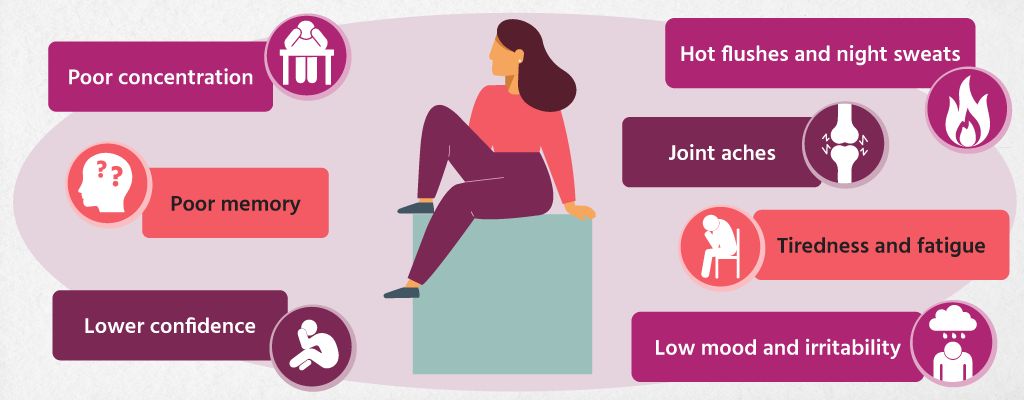
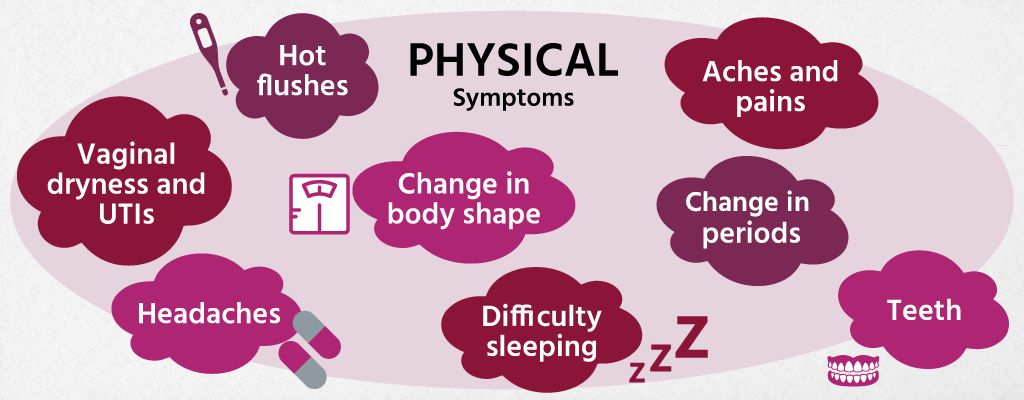
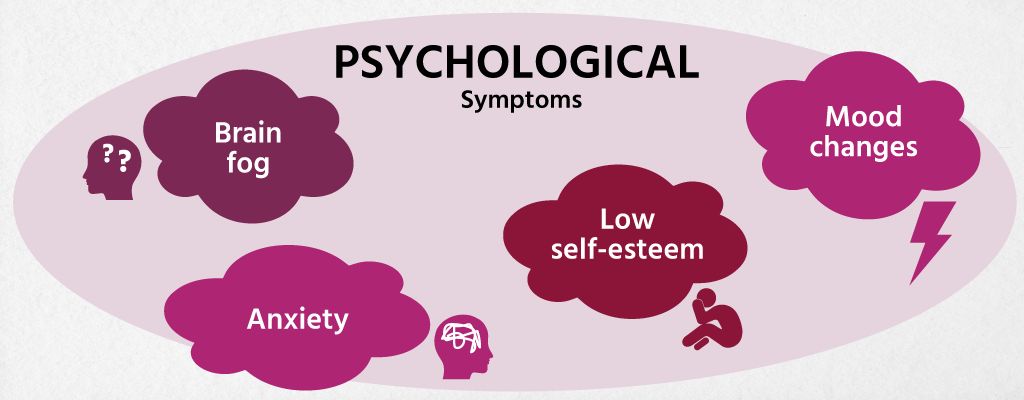
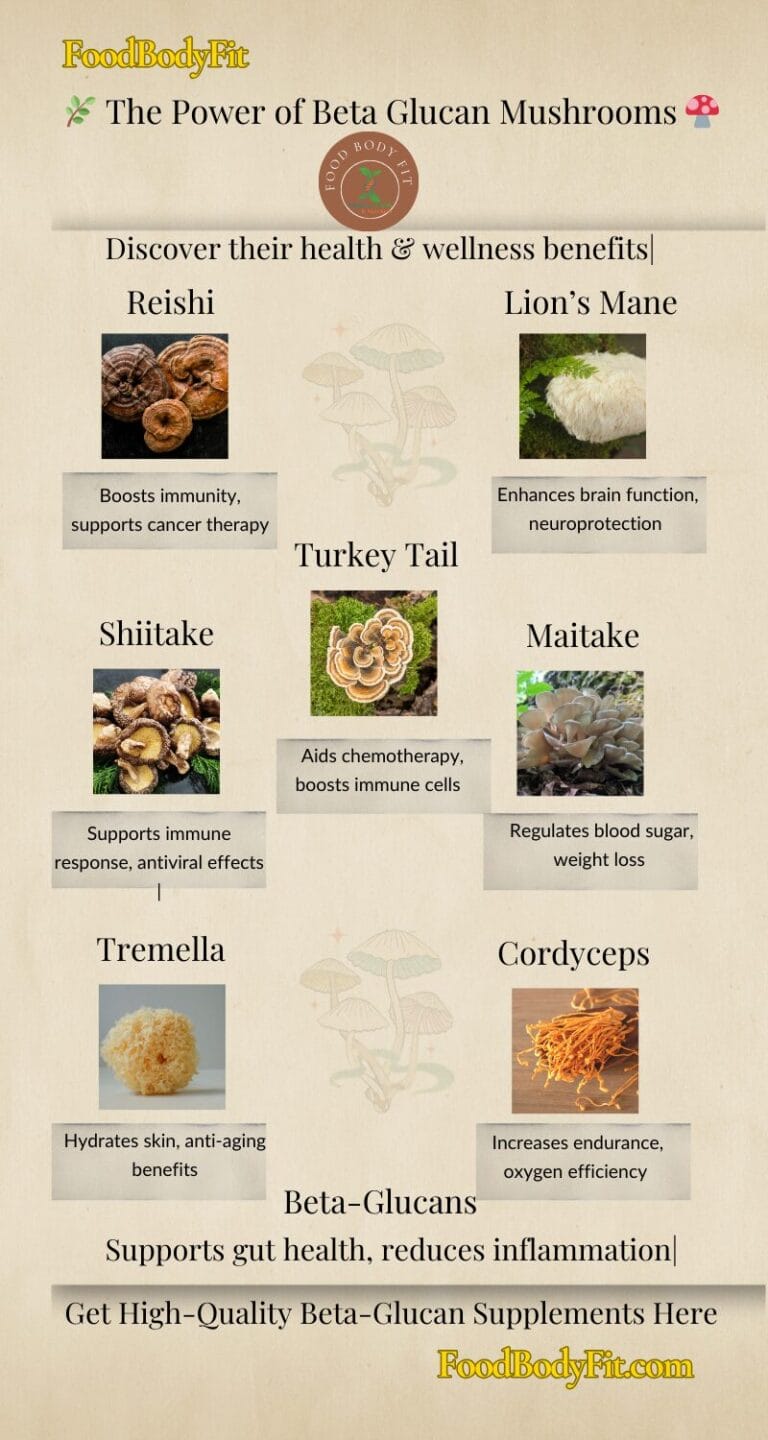
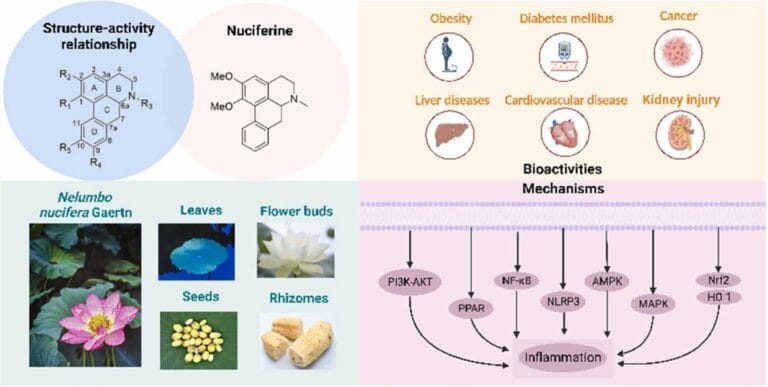
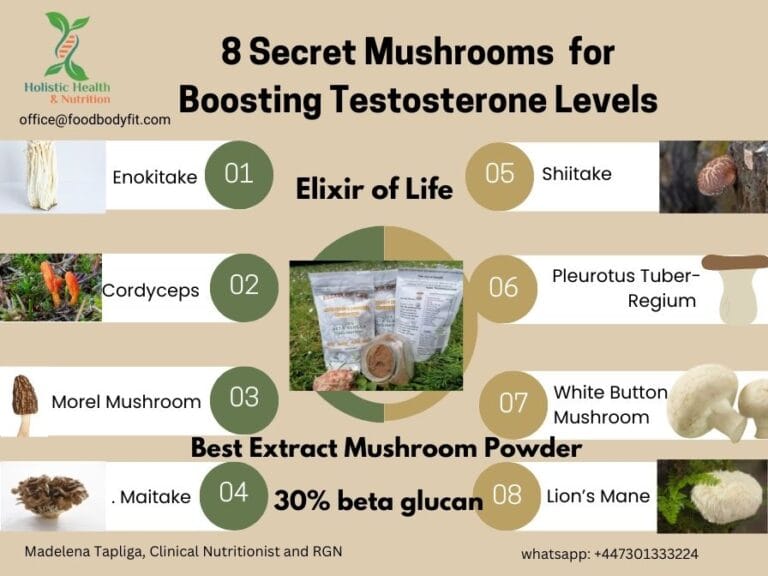
[…] gaining attention for their potential benefits in enhancing female fertility by possibly improving hormonal balance and overall reproductive […]
[…] dosage, quality of the supplement, and individual health can affect the timeframe. Higher-quality extracts may work faster due to better […]
[…] have been linked to increased testosterone levels. Each type works differently in the body. Shiitake mushrooms provide nutrients that support overall hormone health. Resihi and Lions Mane, Turkey Tail […]